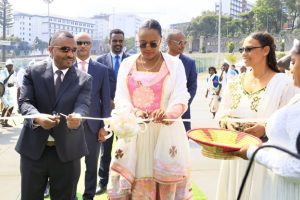
The ongoing controversy regarding citizenship and identity politics has created havoc in terms of respecting the laws of the constitution and prolonging the time to reach national consensus on basic values of nation building, some politicians so remarked. Approached by The Ethiopian Herald, Chief of Staff at Amhara National Movement (ANM) Party Belete Kassa argues that identity politics is the pre-requisite to build citizenship politics; first people must organize to break the yoke of oppression.
Then, national unity comes when national consensus is reached related to the flag, the history, and nation building issues, he added. As to Belete, national unity currently has no constitutional support. For example, Article 3 of the constitution governs that ‘members of the Federation may have their respective flags and emblems and shall determine the details thereof through their respective legislatures.’ “In real life situations, any party engaged in citizenship politics cannot move and expand their ideologies freely in every state of the country.”
Belete believes, “At these fragmented situations, the movement towards identity politics is compulsory; but, if the questions raised in this regard can be reacted in genuine politics, citizenship politics is essential.” Political Affairs Director of the dissolved Ginbot 7 Party, Ephrem Madebo, told Addis Zemen daily that our understanding of Ethiopian unity is becoming blurred and immoral. The difference is greater even in the national flag which symbolizes Ethiopia’s nationality, Ephrem adds. “These miscellaneous situations are now shrinking the paths geared towards nation building; subsequently, the new generation is misplacing the culture of national unity and ethnic identity off the beam.”
Currently, there are large numbers of young people who are unaware of the difference and relevance of citizenship and identity politics, Ephrem said adding that, these impediments are seen obstructing the energies goes for national unity. In Ethiopia, the political system that has been prone into one party rule for the past 27 years had not been appropriate as a nation, even for household level,” said Ephrem. “Ethiopia is a nation with over a hundred million people and immense natural resources. We need to build up Ethiopian unity to strengthen the country’s supremacy uttered for centuries-long attachment along with its untapped assets.”
As to Ephraim, “It may not have to be the same in every issue, but the subject of national consensus and Ethiopian unity should not be posed for negotiation,” his party has strong belief. Cognizant of the fact though it is hard to work for Ethiopia’s unity and prominence, seven independent political parties fused as a national party with the new name (Ethiopian Citizens for Social Justice), these parties are genuinely trusted each other in this regard, Ephraim says. Ephraim argues that the Union will help to getting the attitude of citizen politics and identity politics on the track of nation building, otherwise the repelling force of the two interventions have been able to defy the unity of the country.
Narrowing the gap between the two sides, all political parties have to come up with working for the national unity, and must be prepared for next year national election, he says. Noting that it took six months to sign a memorandum of understanding with the 107 parties, Ephraim said the yet to come Ethiopia should not be confined to the interests of 107 parties. Unless reached on Ethiopia’s unity, the country will not able to continue as a nation. Agreed with Ephraim, the Ethiopian Social Democratic Party (ESDP) President, Prof. Beyene Petros, emphasized the issue of Ethiopian Unity should not be questioned or negotiated in nation building. That is the instance, “we the parties are joined in the political landscape believing in the significance of Ethiopian unity,” he adds.
“It is impossible to undermine Ethiopia’s unity while living in Ethiopia. The constitution does not allow too. The context is not clear to me that Prime Minister Dr. Abiy Ahmed often speaks on strengthening Ethiopia’s unity. ‘Ethiopian unity’ should not be a subject of discussion.” “Even though they provoked for the recognition of the nations, nationalities and peoples over the last 27 years, they were under the Ethiopian unity,” Prof. Beyene said, “no work has been implemented on common values, and today it is unfitting to negotiate on Ethiopian solidarity unless it is a narrative of their anger and prejudice.”
The Ethiopian Herald May 11/2019
BY ZELALEM GIRMA




